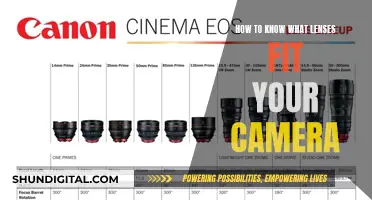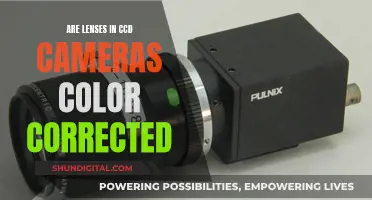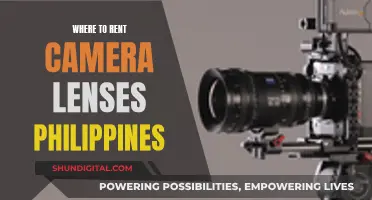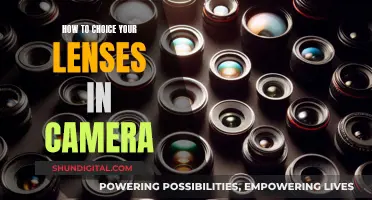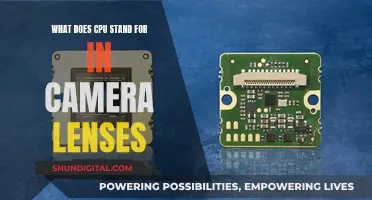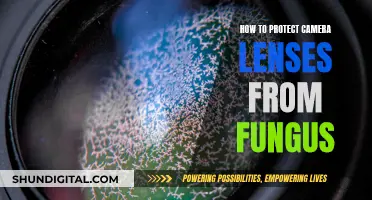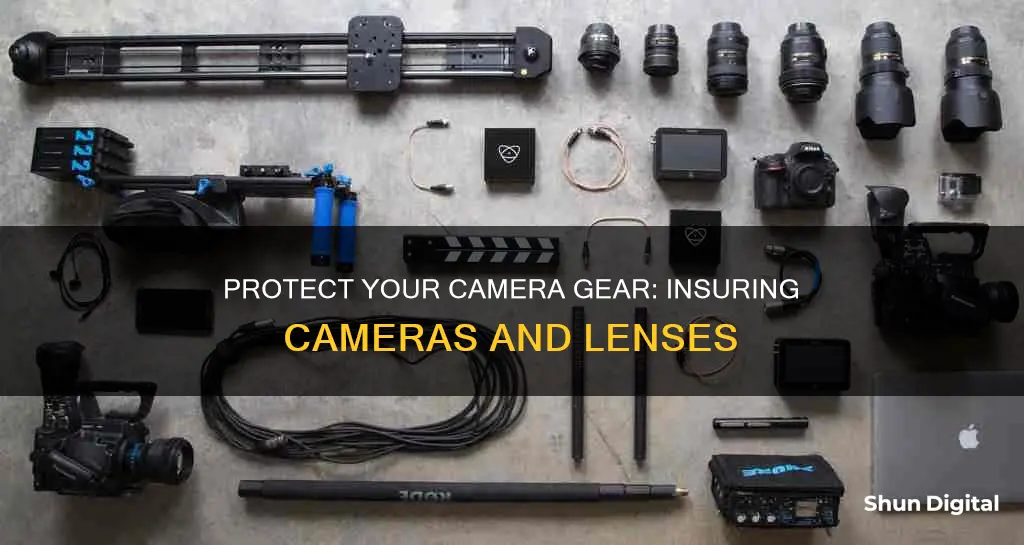
Cameras and their lenses are expensive pieces of equipment, and it's important to consider how to protect them from damage, loss, or theft. Camera insurance is a type of electronic device insurance that covers photography and videography equipment for repairs and replacements in the event of accidents or perils such as lightning, theft, or fire. This insurance is designed for both professional and amateur photographers, with policies available for a range of camera types, from simple point-and-shoot to professional-grade DSLR cameras. It's worth noting that standard homeowners and renters insurance policies may provide some coverage, but they often have limitations and higher deductibles. To ensure your camera equipment is fully protected, it's advisable to consider a specialized camera insurance policy, which can offer worldwide coverage and protect your gear during transportation and use in various locations.
| Characteristics | Values |
|---|---|
| What is covered? | Camera body, lenses, gimbals, lighting equipment, portable backdrops, props, memory cards, batteries, card readers, chargers, underwater camera housing, video cameras, action cameras, etc. |
| Who is it for? | Professional and amateur photographers, including wedding, portrait, wildlife, landscape, event, concert, commercial, product, sports, underwater, fashion, and hobbyist photographers. |
| When to get it? | When you have made sizeable investments in your camera equipment (a few thousand dollars' worth). |
| Why get it? | To protect against damage and theft and to mitigate or eliminate out-of-pocket costs that stem from a claim or accident. |
| Cost | $2.92-$349 per year for equipment worth $199-$15,000. |
| Deductible | $250 per claim. |
| How to get it | Contact an insurance provider, or get a quote and purchase directly from their website. |
What You'll Learn

What types of insurance cover cameras?
There are several types of insurance that cover cameras and related equipment. These include:
- Homeowner's or renter's insurance: This is an excellent option for those who want to insure their camera for theft, fire, or vandalism. It covers a wide range of scenarios, from theft to accidental damage. However, if you want to insure your camera against accidental damage or mysterious disappearance, you'll need to get extra coverage.
- Business owner's policy: This is ideal for photographers or cinematographers operating a studio or office. This policy covers equipment and protects against property damage or bodily injury claims stemming from business operations.
- General liability insurance: This is suitable for solo artists or small production companies. It covers damages or injuries that occur during a shoot.
- Business property insurance: This policy focuses on equipment, especially if it is stored in studios, offices, or external locations.
- Photography equipment insurance: This type of insurance is designed specifically for photographers and covers cameras, lenses, lighting equipment, and other camera-related gear. It can be purchased as an add-on to an existing insurance policy or as a standalone policy.
- Rented equipment coverage: This type of insurance protects production equipment rented from third parties and can include custom policy terms, personalized insurance limits, and worldwide coverage.
- Owned equipment coverage: This type of insurance covers personally owned equipment and can also be extended to rented gear. It offers worldwide coverage and the option to add rented equipment coverage.
Camera Lenses: Is Price Tag Directly Linked to Quality?
You may want to see also

How much does camera insurance cost?
The cost of camera insurance depends on the type of camera, the level of coverage, and the insurance provider.
For example, Full Frame Insurance offers camera equipment insurance starting at $55 per year for up to $1,000 in coverage per item with a $5,000 aggregate limit. Their highest amount of coverage caps at $349 per year for up to $15,000 in coverage per item with a $75,000 aggregate limit.
Lemonade, another insurance provider, offers Extra Coverage for your camera, which can cost anywhere from $2 to $10 per month, depending on the value of the equipment.
It's important to note that the cost of camera insurance can vary, and it's always a good idea to get quotes from multiple insurance providers to find the best coverage for your needs.
Mounting 42mm Lenses: Adapting for X-Mount Cameras
You may want to see also

What does camera insurance cover?
Camera insurance can protect your camera and its accessories from accidental damage, theft, and natural disasters, depending on your policy.
Camera insurance policies can cover a range of incidents and perils, including:
- Accidental damage: This includes drops, cracks, and liquid damage.
- Power surges caused by lightning.
- Natural disasters: Some policies cover fire and flood damage.
- Theft: This includes theft of the camera and its accessories.
- Vandalism: Some policies cover acts of vandalism.
Additionally, camera insurance can cover equipment other than the camera body, such as:
- Lenses.
- Lighting equipment.
- Tripods.
- External flashes.
- Gimbals.
It's important to note that camera insurance typically does not cover:
- Rented gear: Most policies only cover equipment owned by the policyholder.
- Unattended gear left in a vehicle: Unless the owner or employee is within 10 yards during loading or unloading.
- Drones: Due to high loss probability and certain FAA regulations.
- Memory cards and stored digital images: Most policies only cover physical equipment.
Whether you need camera insurance depends on your specific situation. If you have a high-end camera and expensive accessories, camera insurance can protect against pricey repairs or replacements. Standard homeowners or renters insurance policies may already cover your camera to some extent, but they often have high deductibles and may not cover accidental damage. Camera insurance can provide extra protection and peace of mind, especially for photographers who travel or work in various settings.
UV Light: Friend or Foe to Camera Lenses?
You may want to see also

Is my camera covered by my homeowners or renters insurance policy?
If you're wondering whether your camera is covered by your homeowners or renters insurance policy, the answer is: it depends.
Your standard renters or homeowners insurance policy typically covers your camera and related equipment in certain circumstances, such as theft, fire, or vandalism. However, it usually won't cover accidents like drops or water damage. Additionally, if you use your camera for professional or business purposes, even occasionally, it may not be covered by your base policy.
Most home and renters insurance policies cover cameras and equipment used for personal purposes up to a certain amount, known as a "sublimit". For example, your camera may be covered up to $2,500 if you're at home and up to $1,500 if you're away from home. Keep in mind that your deductible will apply before the sublimit, reducing the amount you receive in a claim.
If you want more comprehensive coverage for your camera, you can consider adding "Extra Coverage" or "scheduled personal property coverage" to your policy. This type of coverage includes protection against accidental damage and mysterious disappearance, in addition to the perils covered by the base policy. However, cameras used for professional or business purposes are generally not eligible for Extra Coverage.
If you own very expensive camera equipment or want coverage for additional scenarios, such as those covered by photographer liability insurance, you may want to consider a separate camera insurance policy or a business owner's policy. Camera insurance policies can offer protection from accidental drops, water damage, power surges, and more, and they often have more budget-friendly deductibles.
When deciding on the best option for insuring your camera, it's important to review your existing policies carefully and consider the value of your equipment, how you use it, and the specific risks you want to be covered against.
Understanding Camera Lenses: Power of Convergence and Divergence
You may want to see also

How to get camera insurance
Camera insurance is a specialised type of insurance that covers your camera and accessories. It is designed to protect your equipment from damage, theft, and other unforeseen events. This includes protection from power surges caused by lightning, accidental damage, and loss.
There are a few ways to go about getting camera insurance. Firstly, you can check if your existing homeowners or renters insurance policy provides coverage for your camera equipment. Standard policies often include personal property coverage, which may extend to cameras and accessories in certain circumstances, such as damage caused by fire or theft. However, homeowners insurance typically does not cover business equipment without additional coverage and charges. It also may not cover accidents like drops and water damage.
If you are looking for more extensive coverage, you can consider purchasing a separate camera insurance policy. This type of policy can offer extra protection from accidental damage, water damage, and theft. When purchasing a separate policy, you will need to provide details and proof of the value of your equipment, such as receipts, model and serial numbers, and replacement costs.
Additionally, if you are a professional photographer, you may want to look into a business owners policy, which provides commercial coverage for freelance and small business owners. This type of policy can include liability coverage, protecting you from dissatisfied clients or damage caused to others or their property while working.
When choosing an insurance provider, it is important to consider your specific needs and the limits and coverage offered by the policy. You may also want to compare premiums, deductibles, and the reputation of the insurance company. Getting camera insurance can provide you with peace of mind and protect your equipment from unexpected incidents.
Lens and Camera Compatibility: Are Lenses Camera-Specific?
You may want to see also
Frequently asked questions
The cost of camera insurance depends on the type and amount of coverage you require. Basic policies typically start with $10,000 worth of personal property coverage. The cost to insure a camera with renters insurance or via different home insurance quotes depends on the type of coverage, the number of items insured, and their value. For example, insurance for $199 worth of camera equipment can cost as low as $2.92 per month.
Camera insurance covers photography and videography equipment for repairs and replacements due to various perils, including theft, fire, vandalism, lightning, and accidental damage. It also covers power surges and water damage in certain situations.
Your homeowners or renters insurance policy may provide limited coverage for your camera and related equipment in certain circumstances, such as theft and fire. However, it typically won't cover accidents like drops and water damage. You may need to add a rider or endorsement to your policy for more comprehensive coverage.
You can purchase camera insurance from specialised providers like Full Frame Insurance, Lemonade, Progressive Electronic Device Insurance, and Insure My Equipment. These companies offer various coverage options and additional services to meet your specific needs.


